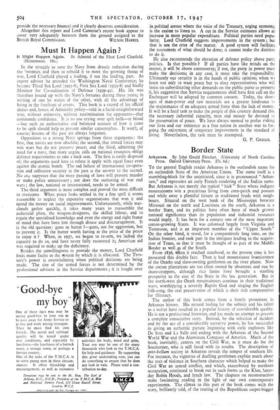Border State
To the general English reader Arkansas is the outlandish name for an outlandish State of the American Union. The name itself is a stumbling-block for the uninitiated, since it is pronounced " Arkan- saw," and represents an early French rendering of the Indian name. But Arkansas is not merely the typical " hick " State where indigent mountaineers win a precarious living from corn-patch and possum and while away a plentiful leisure in traditional feuds with neigh- bours. Situated on the west bank of the Mississippi between Missouri on the north and Louisiana on the south, Arkansas is a border State, and its politics have often been of much greater national significance than its population and industrial resources would imply. It has been for a century one of the most important cotton-growing States. It was colonised largely from Virginia and Tennessee, and is an important member of the "Upper. South." On the other hand, it stood, for a comparatively long time, on the Indian frontier, and took part in the intrigues leading to the acquisi- tion of Texas, so that it must be thought of as part of the Middle Border as we11,0 of the South.
From 1836,sttiL en it reached statehood, to the present time it has presented this double face. Then it had mountaineer frontiersmen of the Ozarks and slave-owning gentlemen on the river plains. Now the cotton plantations are too often owned by absentees and run by share-croppers, although rice farms have brought a startling prosperity to the east of the State in the last generation. But in the north-west the Ozark mountaineers continue in their traditional ways, worshipping a severely Baptist God and singing the English folk-song, the oral preservation of which is their rich compensation for illiteracy.
The author of this book comes from a family prominent in Arkansas history. His natural feeling for the subject and his talent as a writer have resulted in a popular history of considerable quality. He is not a professional historian, and has made no attempt to present a complete consecutive story. Instead, by the selection of incident and by the use of a considerable narrative power, he has succieded in giving an authentic picture beginning with early explorers like De Soto and La Salle and ending with the Arkansas of the Second World War and the Aluminum Company of America. Much of the book, inevitably, centres on the Civil War, as it must do for the Southerner, who is still faced with its results. The description of ante-bellum society in Arkansas reveals the temper of southern life. For instance, the vignettes of duelling gentlemen explain much about the trait of violence in Southern character which helped to make the Civil War an armed conflict, and which, exacerbated by northern occupation, continued to break out in such forms as the Klan, latter- .day Robin Hoods, and lynch law. The chapters on reconstruction make fascinating reading in the light of our own contemporary experiments. The climax to this part of the book comes with the story, brilliantly told, of the routing of the Republican carpet-bagger
regime in the State in x872 by a combination of conservative • "skalawag " Republicans and the general body of ex-Confederate Democrats. This took the form of a miniature civil war between two State Governors, each claiming to be legally elected. Rival forces were recruited under the nicknames of " Minstrels " and "Brindle Tails," and engagements were fought in and around the State Capitol at Little Rock.
It is perhaps symptomatic of the author's native outlook that the general impression given by the book of Arkansas's more recent history is less vivid. Even so, there is much that is revealing. The account of Jeff Davis, for instance, the backwoods demagogue who became Governor and then U.S. Senator about the turn of the century, has something in it of the career of Huey Long. There is nothing better in the book than the section on the present-day mountaineer and the share-crapper, with its wistful affection for the anachronistic qualities of the one' and for the despairing struggle of the other. The book closes by touching on some of the problems facing present-day Arkansas, when a new prosperity, particularly in the mining of bauxite and in the provision of cheap electrical power, has brought with it problems in political control. One is left with the feeling that Arkansas, like other States, is unlikely to maintain its political and cultural independence much longer.
FRANK THISTLETHWAITE.



































 Previous page
Previous page